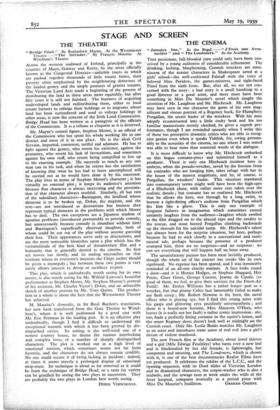THE CINEMA
"Jamaica Inn." At the Regal. —" J'Etais une Aven- turiere " and "The Londoners." At the Academy.
Tuts passionate, full-blooded yarn could only have been con- ceived by a young authoress of considerable refinement. The drinking, leching, blaspheming, Cornish wreckers are remi- niscent of the noisier characters in Shakespeare acted at a girls' school—the well-cushioned Falstaff with the voice of beloved Miss Peridew, the games-mistress, and tight-laced Pistol from the sixth form. But, after all, we are not con- cerned with the story: a bad story is a small handicap to a good director or a good actor, and there must have been something in Miss Du Maurier's novel which caught the attention of Mr. Laughton and Mr. Hitchcock. Mr. Laughton may have seen in one character the germ of his own mag- nificent and vinous portrait of a Regency buck, Sir Humphrey Pengallan, the secret leader of the wreckers. With his nose adeptly reconstructed into a little cocky beak and his too familiar mannerisms sternly checked, he gives a superb per- formance, though I am reminded uneasily when I write this of those too perceptive dramatic critics who are able to recog- nise genius even when it speaks Yiddish, for, owing presum- ably to the acoustics of the cinema, no one where I was seated was able to hear more than scattered words of the dialogue.
It is more difficult to know why Mr. Hitchcock embarked on this bogus costume-piece and submitted himself to a producer. There is only one Hitchcock incident here in embryo, when the pseudo-wrecker, saved by the heroine from his comrades who are hanging him, takes refuge with her in the house of the nearest magistrate, and he, of course, is Pengallan, the wreckers' leader. This situation translated into contemporary terms might well have been the high-spot of a Hitchcock chase, with rather more care taken over the realistic details ; but costume has so confused Mr. Hitchcock that he allows the hero, wet through by a long swim, to borrow a tight-fitting officer's uniform from Pengallan which
fits him like a glove. This is only one example of frequent failures in imagination which sometimes caused
untimely laughter from the audience—laughter which swelled as the film dragged on to the absurd rape and the cavalry to the rescue, and stout booted Pengallan climbing backwards up the shrouds for his suicidal jump. Mr. Hitchcock's talent
has always been for the surprise situation, but here, perhaps because he had to stick closely to a conventional and senti- mental tale, perhaps because the presence of a producer cramped him, there are no surprises—and no suspense: we can see everything that will happen half an hour away.
The unsatisfactory picture has been most lavishly produced, though the whole set of the sinister inn creaks like its own signboard. No expense has been spared, and I was irresistibly reminded of an all-star charity matinee. A face looks round a door—and it is Horace Hodges, or Stephen Haggard, Hay Petrie, Clare Greet, George Curzon, Jeanne de Casalis (so good of them, we feel, to give their services for the Fresh-Air Fund). Mr. Emlyn Williams has a rather longer part as. a wrecker, but that plump Celtic face lamentably failed to make my flesh creep ; Mr. Robert Newton is the hero, the naval officer who is playing spy, but I find this young actor with his gasps and glittering eyes peculiarly unsympathetic ; and there is a brand-new heroine, Miss Maureen O'Hara, who leaves (it is really not her fault) a rather comic impression: she, too, finds a perfectly fitting costume in the squire's house, and the smart Regency dress doesn't look well at midnight pn the Cornish coast. Only Mr. Leslie Banks matches Mr. Laughton as an actor and introduces some sense of real evil into a girl's dream of violent manhood.
The new French film at the Academy, about jewel thieves and a girl (Mlle Edwige Feuilliere) who turns over a new leaf and is blackmailed by her old friends, is lightweight, but competent and amusing, and The Londoners, which is shown with it, is one of the best documentaries Realist Films have yet produced. It celebrates the jubilee of the L.C.C., and the opening sequence, with its Dore slides of Victorian London and its dramatised characters, the corpse-washer who is also a midwife, and the sewage men at work under the walls of the fever hospital, compares ironically as a period piece with Miss Du Maurier's feuilleton. GRAHAM GREENE.


















































 Previous page
Previous page